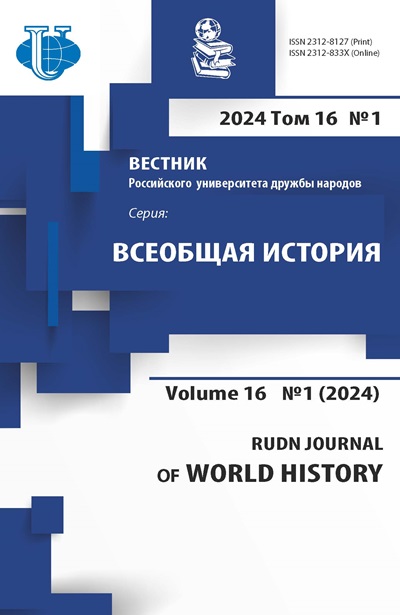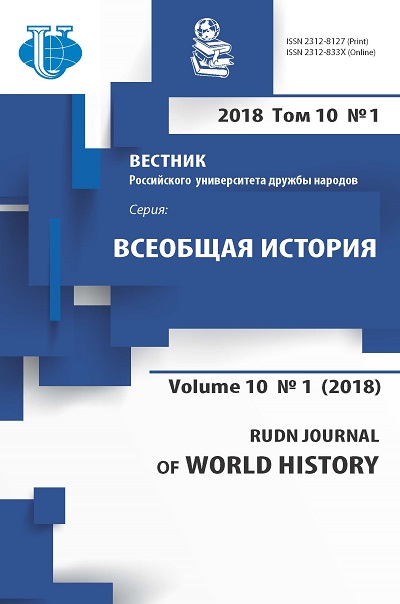ON THE ISSUE OF THE EARLY INTERACTIONS OF THE MANCHU RULERS WITH TIBETAN LAMAS
- Authors: Kitinov BU1, Qiang L.1
-
Affiliations:
- Peoples’ Friendship University of Russia
- Issue: Vol 10, No 1 (2018)
- Pages: 79-85
- Section: Oriental Studies
- URL: https://journals.rudn.ru/world-history/article/view/18805
- DOI: https://doi.org/10.22363/2312-8127-2018-10-1-79-85
Cite item
Full Text
Abstract
The article is devoted to the study of the early connections of the Manchu rulers with the highest leadership of Tibetan Buddhism. Probably, the countdown should be conducted from the 1620s, when the Manchus intensified their interaction with the Mongolian peoples (Chakhars), where the Tibetan lamas already had strong positions. Further development of Buddhism among the Manchus happened due to the important political events: the coming of the Dalai Lama to power in Tibet in 1642, and the seizure of Beijing by a new Qing dynasty in 1644. For the new rulers of China, lamas had been of the fundamental importance, because, thanks to their support, the Manchus have had the right to claim succession of the government (the “mandate of Heaven”) from the Mongol Yuan dynasty, and at the same time, they were able to “appease” the Mongols. Apparently, after a visit to Beijing by the Dalai Lama in 1652, a new phase of the relationship between emperors and lamas began, which brought the Qing China to clashes with the Dzhungar Oirats.
Keywords
About the authors
B U Kitinov
Peoples’ Friendship University of Russia
Author for correspondence.
Email: kitinov@mail.ru
PhD in History, Associate Professor of the Department of World History, Faculty of Humanities and Social Sciences, Peoples’ Friendship University of Russia
6 Miklukho-Maklaya St., Moscow, 117198, RussiaLiu Qiang
Peoples’ Friendship University of Russia
Email: triumph117@rambler.ru
postgraduate student, The Department of World History Faculty of Humanities and Social Sciences, Peoples’ Friendship University of Russia
6 Miklukho-Maklaya St., Moscow, 117198, RussiaReferences
- Kitinov B.U. Svyashchennyy Tibet i voinstvennaya step’: buddizm u oyratov [The Sacred Tibet and the Warlike Steppe: Buddhism Among Oirats]. M., 2004.
- Kitinov B.U. Kitay: religiozno-dukhovnyy diskurs tsivilizatsionnogo resursa gosudarstva [China: The Religious and Spiritual Discourse of the Civilization Resource of the State] // Mir i politika [World and Politics]. 2011. № 10.
- Lyulina A.G. Eticheskiy aspekt vzaimootnosheniy mezhdu Dalay-lamoy V i imperatorom Shun’chzhi na primere ikh vstrechi v Pekine v 1652 g. [The Ethical Aspect of the Relationship Between Dalai Lama V and Emperor Shunzhi on the Example of Their Meeting in Beijing in 1652] // Vestnik Kalmytskogo instituta gumanitarnykh issledovaniy RAN [Bulletin of the Kalmyk Humanitarian Research Institute of the Russian Academy of Sciences]. 2016. № 1.
- Martynov A.S. Status Tibeta v XVII–XVIII vekakh v traditsionnoy kitayskoy sisteme politicheskikh predstavleniy [The status of Tibet in the XVII–XVIII Centuries in the Traditional Chinese System of Political Views]. M., 1978.
- Uspenskiy V.L. Tibetskiy buddizm v Pekine [The Tibetan Buddhism in Beijing]. SPb., 2011.
- A Collection of Historical Archives of Tibet. Beijing, 1995.
- Grupper S.M. Manchu Patronage of Tibetan Buddhism during the First Half of the Ch’ing Dinasty // Journal of the Tibet Society. 1984. № 4.
- Hevia J.L. Lamas, Emperors, and Rituals: Political Implications in Qing Imperial Ceremonies // The Journal of the International Association of Buddhist Studies, 1993. Vol. 16. № 2.
- Elverskog J. Our Great Qing. The Mongols, Buddhism and the State in Late Imperial China. University of Hawai’i Press, 2006.
- Rockhill W.W. The Dalai Lamas of Lhasa and Their Relations with The Manchu Emperors of China 1644–1908. Dharamsala, 1998.
- Sobraniye arkhivnykh dokumentov i materialov po istorii vzaimootnosheniy mezhdu mestnymi vlastyami Tibeta i Tsentral’nym pravitel’stvom Kitaya so vremeni pravleniya dinastii Yuan’ [The Collection of archival documents and materials on the history of relations between the local authorities of Tibet and the Central Government of China since the reign of the Yuan dynasty]. Beijing, 1994 (in Chinese).













